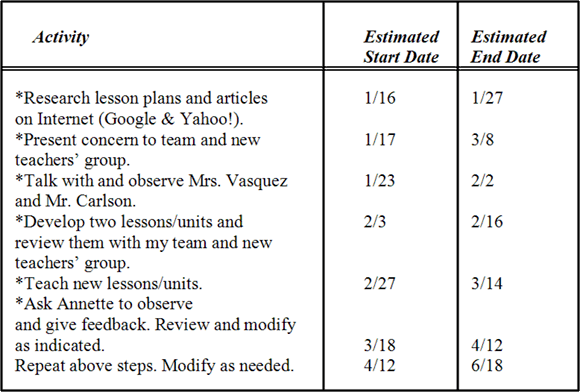|
 |
| Teachers.Net Gazette Vol.5 No.12 | December 2008 |
Subscribe for free home delivery |
|
Teacher’s Inquiry Process (page 3) | |
| by Hal Portner Continued from Teacher’s Inquiry Process (page 2) December 1, 2008 |
|
|
Step 4. Annette: From what you wrote, Gerry, I get the sense that you would like to come up with activities that will help students make those connections. Gerry: Right. I need to create some projects. It might be a good idea to find out what other teachers have done. Annette: Sounds like a good idea. What about your students? Do you know what their interests are that could connect with ancient times? Gerry: I could find out about their hobbies. Step 5. Gerry: I will talk with and arrange to observe my colleagues. Also, I meet with members of my team on a regular basis, and I participate in a new teacher’s group every other week. I’m sure they would have some good ideas. Annette: Excellent. There is a lot of other help out there, too. For example, the Internet is a good resource. You can use a search engine like Google or Yahoo! Enter a key word or phrase, such as impact of ancient history on today’s youth, and follow the promising links it will offer. And you can post your questions and concerns on Internet chatboards such as those on teachers.net. Another good source is the Education Resources Information Center (ERIC), which you can search for articles having to do with your topic. The librarian can help you with this. University faculty, publications, professional organizations, regional and state education agencies—even your family and friends—are other potential resources. Gerry: Great suggestions. Thanks. I can also find out what the district plans to offer in the way of professional development activities that relate to my concern. And I heard that Yahoo.com and HotChalk.com offer a free online service for educators to create, find, and share lesson plans, worksheets, and ideas. Step 6.List specific actions you will undertake to fill or bridge the gaps you have identified. Estimate a start and end date for each action. Annette: Let’s talk about specific activities that you will do. What can be your first steps? Gerry: I will bring my concern to the new teachers’ group. We meet tomorrow afternoon. I can also search on-line for lesson plans. Annette: Cool. Let’s write down activities and time lines. It will serve as a handy reminder and checklist. You will have the satisfaction of crossing off each activity as it is completed. Occasionally you may find it necessary to modify, add to, or omit some activities you’ve listed. By all means do so, but be careful not to compromise the basic intent and integrity of your inquiry and area of concern in the process. Here is Gerry’s list: 
Step 7. Annette: Completing these activities will take time, effort, and stretching, Gerry. Can you honestly say that the activities are achievable and worthwhile; that they represent a worthy challenge? Gerry: Yes, I can. As I said when we began this process, I want my students to get involved in class projects. I love seeing them find a way to hook into what we’re studying. It would be very gratifying to know they are learning and that they enjoy doing so. Annette: I hear and appreciate your enthusiasm and commitment, Gerry. I’ll be looking forward to hearing about your progress, but remember, this is your project. I’m always ready to help wherever I can, so please let me know if you would like to discuss any issue. Step 8. These are the questions Annette asked Gerry:
Gerry did apply what he learned and with positive results. From discussions with his team and new teachers’ group, he organized units to connect history to history (e.g., Compare the way Romans lived to the way other ancient civilizations lived); history to self (e.g., Write a journal of your life as if it were happening in ancient Rome); and history with today’s world (e.g., Compare and contrast ancient governments with contemporary ones). Gerry also learned that many of his students were interested in sports. On the HotChalk, Inc. Web site, he found and successfully adapted a lesson plan by Ms. Senigo titled the “History of the Olympics” with these objectives:
Gerry’s imagined ideal class had come to pass!
This article is adapted from Chapter 5 of Mentoring New Teachers, 3rd edition | |
|


 Hal Portner is a former K-12 teacher and administrator. He was assistant director of the Summer Math Program for High School Women and Their Teachers at Mount Holyoke College, and for 24 years he was a teacher and then administrator in two Connecticut public school districts. From 1985 to 1995, he was a member of the Connecticut State Department of Education’s Bureau of Certification and Professional Development, where, among other responsibilities, he served as coordinator of the Connecticut Institute for Teaching and Learning and worked closely with school districts to develop and carry out professional development and teacher evaluation plans and programs.
Hal Portner is a former K-12 teacher and administrator. He was assistant director of the Summer Math Program for High School Women and Their Teachers at Mount Holyoke College, and for 24 years he was a teacher and then administrator in two Connecticut public school districts. From 1985 to 1995, he was a member of the Connecticut State Department of Education’s Bureau of Certification and Professional Development, where, among other responsibilities, he served as coordinator of the Connecticut Institute for Teaching and Learning and worked closely with school districts to develop and carry out professional development and teacher evaluation plans and programs.